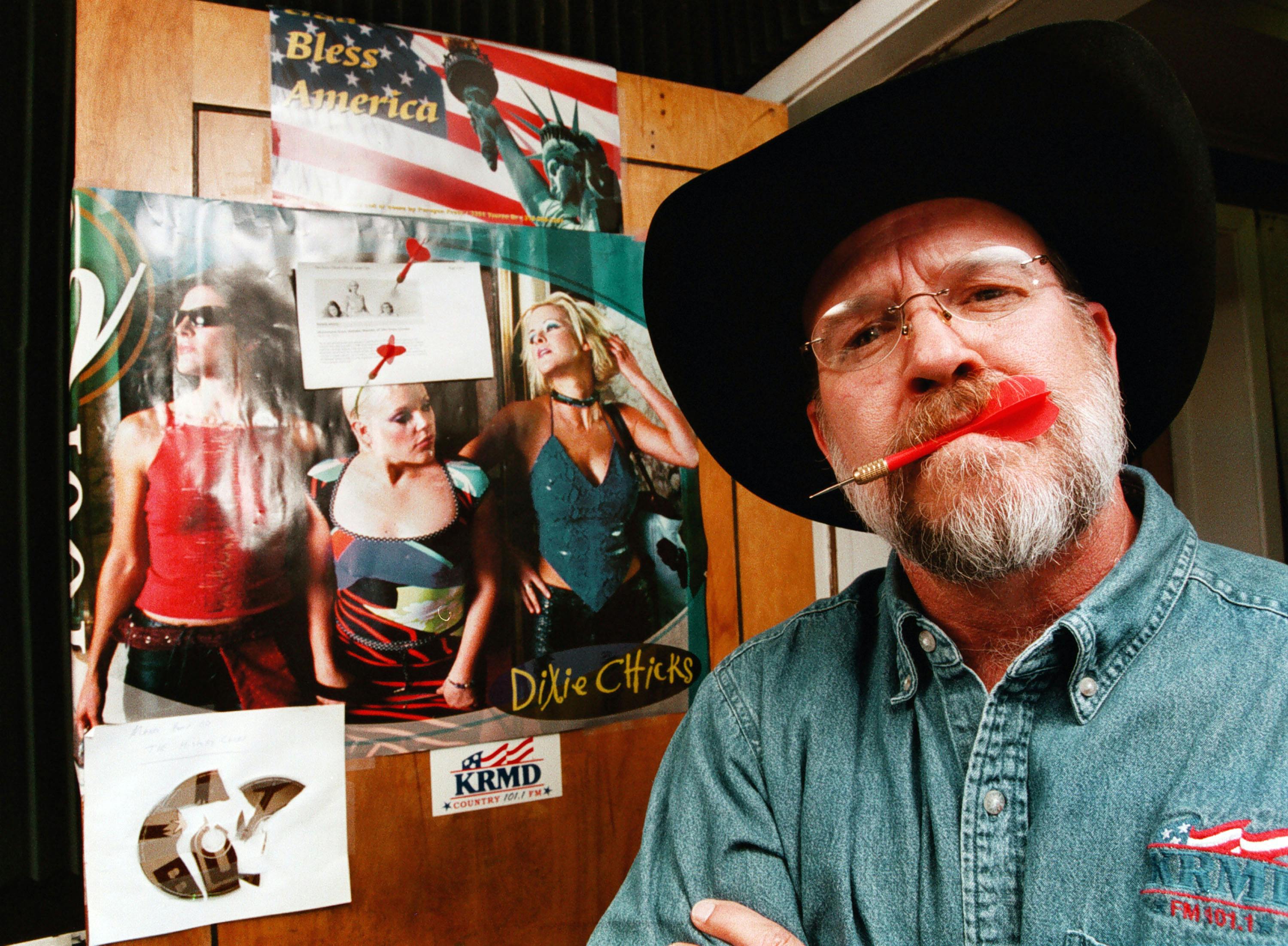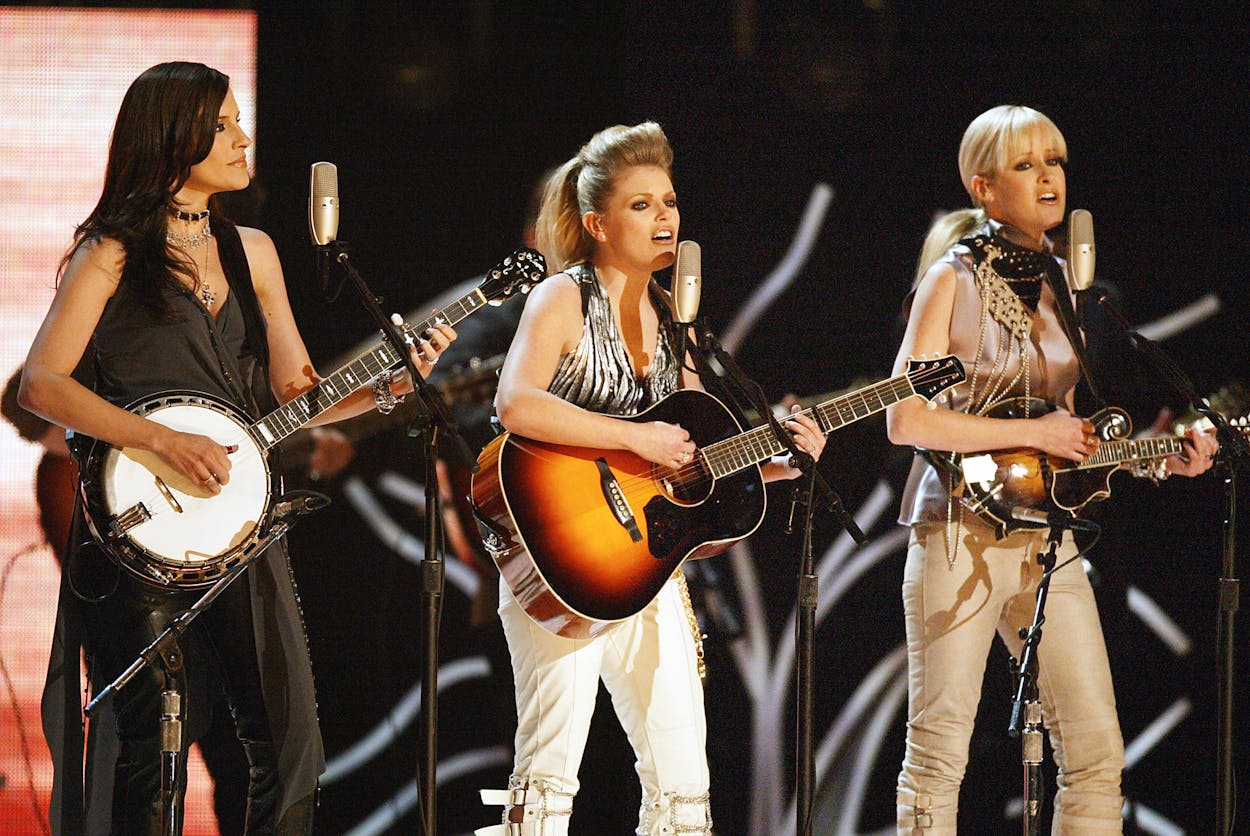On July 6, 2003, the Dixie Chicks disembarked from a plane at Dallas-Fort Worth International Airport and climbed directly into police vehicles bound for the American Airlines Center. It had been nearly three months since Natalie Maines told a London crowd she was “ashamed” that President George W. Bush was from Texas, and the Chicks front woman received a threat that she would be shot dead on stage at her Dallas show.
The invasion of Iraq was still very fresh at that point. Guerrilla groups of Iraqi insurgents began attacking U.S. forces with improvised bombs, leading Bush to vow to continue the occupation despite declaring an end to combat a month prior. Violence in Iraq was high, the political climate in the U.S. was equally fraught—and Maines’s pronouncement from the stage was a powder keg that seemed like it would destroy the Dixie Chicks.
Maines publicly apologized to Bush, saying that her comments in London were “disrespectful,” but that didn’t do much to shut down the controversy. The death threat in Dallas, credible enough that the band was whisked directly back to the airport after the show by police, was a culmination of what could be the biggest controversy in country music.
In 2016, the Chicks returned to stages across the country in the DCX tour that kicked off its U.S. leg in Cincinnati in June. Tonight, the Chicks will appear in Dallas after thirteen years and one month away from the city where the band first got together, and it seems that they can expect a much warmer reception than their last Dallas gig. Tickets to the August 5 show at Gexa Energy Pavilion sold out in minutes, and can be found in the secondary market for upwards of $500 each. Dates in Austin and Houston are also sold out, indicating that Texas is ready to make nice with the former country darlings. But it wasn’t easy.
In the wake of the stage banter heard ’round the world, radio stations unceremoniously pulled the Dixie Chicks’ music from the airwaves. As morning show DJs across the country encouraged listeners to bring Chicks CDs to radio stations where they would be burned or crushed by a bulldozer in 2003, Eric Raines assumed people would would view Maines’s comment as “Natalie being Natalie.”
Raines, who was then a morning show host at Austin’s KASE FM, had apparently underestimated the country’s volatility. “The reason we fell in love with her was because she spoke her mind,” Raines says. “It made people upset, but it’s a thing she did her entire career. The exact reason we loved Natalie Maines was because she was this spunky blonde who did her thing and said what was on her mind, whether it was just to one person or in front of a crowd of thousands.”
At the time, KASE FM was playing almost a dozen different Dixie Chicks songs every single day. The decision to remove the Chicks’ catalog from the station came gradually, but it was final. “We dumped their music off the radio and never put it back on. If you played a Dixie Chicks song, you were going to get in trouble,” Raines says. “Even four and five years later, I was never allowed to put their music back on the radio. ”
Raines views country radio’s reaction as a betrayal to the Dixie Chicks. “This is a band that made a lot of people across the country really rich, that earned radio stations a lot of ratings, and we just turned on them,” he says. Nowhere was that sting more sharp than in Maines’s hometown of Lubbock. Born in nearby Levelland and a graduate of Lubbock High School, Maines is part of a West Texas musical dynasty. Her father, Lloyd Maines, is a legendary Texas musician and producer.
As Wes Nessman, host of “The Rock Show” on Lubbock’s Rock 94.5, remembers it, the uproar in Lubbock was swift and intense. His daughter, who was working as a receptionist at the station in 2003, was inundated with threats of murder and rape because the Dixie Chicks weren’t immediately removed from the rotation of Rock 94.5’s country sister-station. “I was on the morning show, so of course this was a little bit of fodder for us. We never realized that it was going to blow up and become this obsession,” Nessman says. “We didn’t remove it quick enough. It got that insane around here.”

Prior to those comments in London, Natalie Maines was the biggest thing to hit Hub City since Buddy Holly, who the city didn’t always claim as its own. When Nessman first moved to Lubbock, the Buddy Holly memorial statue had not yet been erected. There were no murals at Lubbock International Airport honoring Holly, who was the city’s first real national celebrity. And before his untimely death in an airplane crash in 1959, Buddy Holly was ostracized in the city because, as Nessman believes, he was a white man who married a Hispanic woman.
In many ways, the parallels between what happened to Natalie Maines and Buddy Holly are too stark to ignore. “It’s the exact same thing that this town did to Buddy Holly,” he says. “They attacked this girl like she was a cancer. When I first moved here, there was no recognition for Buddy Holly in this town. It was very gradually that things started to come around, and it took a really long time.”
But this time, reconciliation may not come as easily. “This town still has a huge—huge—simmering anger with this young lady. It’s not that much different now than it was back then,” Nessman says. “If I put up a poll asking if we should forgive the Dixie Chicks, I think nine out of ten people would say ‘no’ even now. People are still pissed off about it. It’s just something we do around here. We eat barbecue and we hate the Dixie Chicks.”
Two years after the peak of the furor, Lubbock would be ranked the second most conservative city in the country, just behind Provo, Utah. The city has since dropped out of the top ten, but it remains fiercely conservative. In 2012, Lubbock County judge Tom Head made headlines for claiming that President Obama would send United Nations troops into the city to quell any “uprising” against his presidency.
The irony isn’t lost on Nessman. “What’s funny is that it’s the same people who say things a hundred times worse about President Obama now,” he says. “It’s very, very embarrassing if you ask me, but that’s the political climate today. We just saw a preview of it back when Natalie made her initial statement.”
Despite the lingering anger, there are some in Lubbock who are ready to make amends. Last September, Maines was honored on the West Texas Walk of Fame alongside Holly and brief Littlefield resident Waylon Jennings. “Inducting Natalie was an apology, but I believe that ship has sailed in terms of Lubbock and Natalie Maines ever being partners in each other’s futures,” Nessman says. “I don’t think Natalie is ever going to forget what Lubbock has done to her and the way she has treated her, but she does forgive. How do you come back to a place, and do them a favor, after people in that place said that they were going to kill you?”
Outside of West Texas, though, it’s clear that the anger has, for the most part, blown over. Now, just over half of the country agrees that the conflicts in Afghanistan and Iraq were a mistake. The Dixie Chicks are selling out arenas across the globe, and that likely doesn’t have much to do with country music fans who were angered after Maines’s comments having a change of heart or forgetting about what happened. Instead, it’s fans who have always loved the Chicks for making some of the best country music of the past two decades, politics be damned.
But even today, both Raines and Nessman agree that playing the Dixie Chicks is a surefire way to light up social media and the phone lines. “Everyone still has a take on it. If you want to have a passionate conversation, bring up the Dixie Chicks,” Raines says. “Some of the biggest arguments I’ve ever gotten in on the radio have been over the Dixie Chicks. People are mad about it, and they don’t really know why they’re mad. They just have this response to it. Here’s the funny thing about that, though. If I just play their songs and don’t mention the Dixie Chicks, my phone doesn’t ring and I don’t see anything on Facebook or Twitter. It’s when you bring that name up, that’s when people react.”
That inevitability of a massive backlash still keeps the Dixie Chicks off the radio. No major country stations have added them back into the rotation, and as a result, left-leaning country artists have by and large stayed out of the political fray ever since. Even Toby Keith, who famously fanned the flames at the height of the controversy by projecting an image of Natalie Maines cozying up Iraqi dictator Saddam Hussein in his live show, has taken heat from conservatives on issues ranging from his support of marriage equality to a decision to ban weapons from his restaurant in Virginia.
But even as the Chicks’ songs about domestic violence and the Vietnam War were replaced on the radio airwaves with audience friendly party anthems about trucks, beer, and girls, the past two or three years have revealed a shift. East Texan Kacey Musgraves’s songs about LGBT rights and pot and Little Big Town’s semi-controversial “Girl Crush” enjoyed commercial success.
It seems that the lineage of outside-the-box female artists now finding success in country music can be traced directly back to the Dixie Chicks, even if they’re not welcome back on the airwaves. “Country radio is a whole lot less conservative now than it was,” Raines says. “They pushed the envelope and busted it open for a lot of people who say what they think.”






